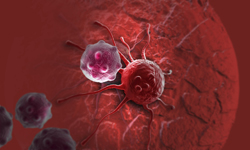Molecular switch in cancer development
Microenvironment influences the oncogenic and migratory properties of cancer cells through the secretion of various growth factors, hormones and other molecules. Central for the delivery of these signals is the ERK pathway, which transmits information through sequential phosphorylation of its effector proteins Raf, MEK and ERK. Although the biochemical events that occur during signal transduction have been characterised, little is known about the biological responses stemming from this pathway. The EU-funded PROMOTE reintegration grant at the Institute of Microbiology in Prague aimed to address this. Project work focused primarily on delineating the function of the scaffold protein RACK1 that associates with the core kinases of the ERK pathway. An unprecedented role for RACK1 was observed in the so-called symmetry-breaking process. This process is essential for cell division and cell migration during development and body patterning. Researchers found that RACK1 made adherent cells lose their perception of position, causing them to migrate. RACK1 was also found to be implicated in maintaining cell polarity in migrating cells and converting epithelial cells to migratory ones. This was achieved by controlling the activity of different ERK substrates. By phosphorylating a distinct set of substrates at a given moment in a particular location, ERK signalling was responsible for different biological responses such as cell migration. The identification of RACK1 as a molecular switch in ERK signalling for proliferation versus migration could shed light onto the complex process of cancer development. Importantly, it could serve as a future target for cancer therapy.







